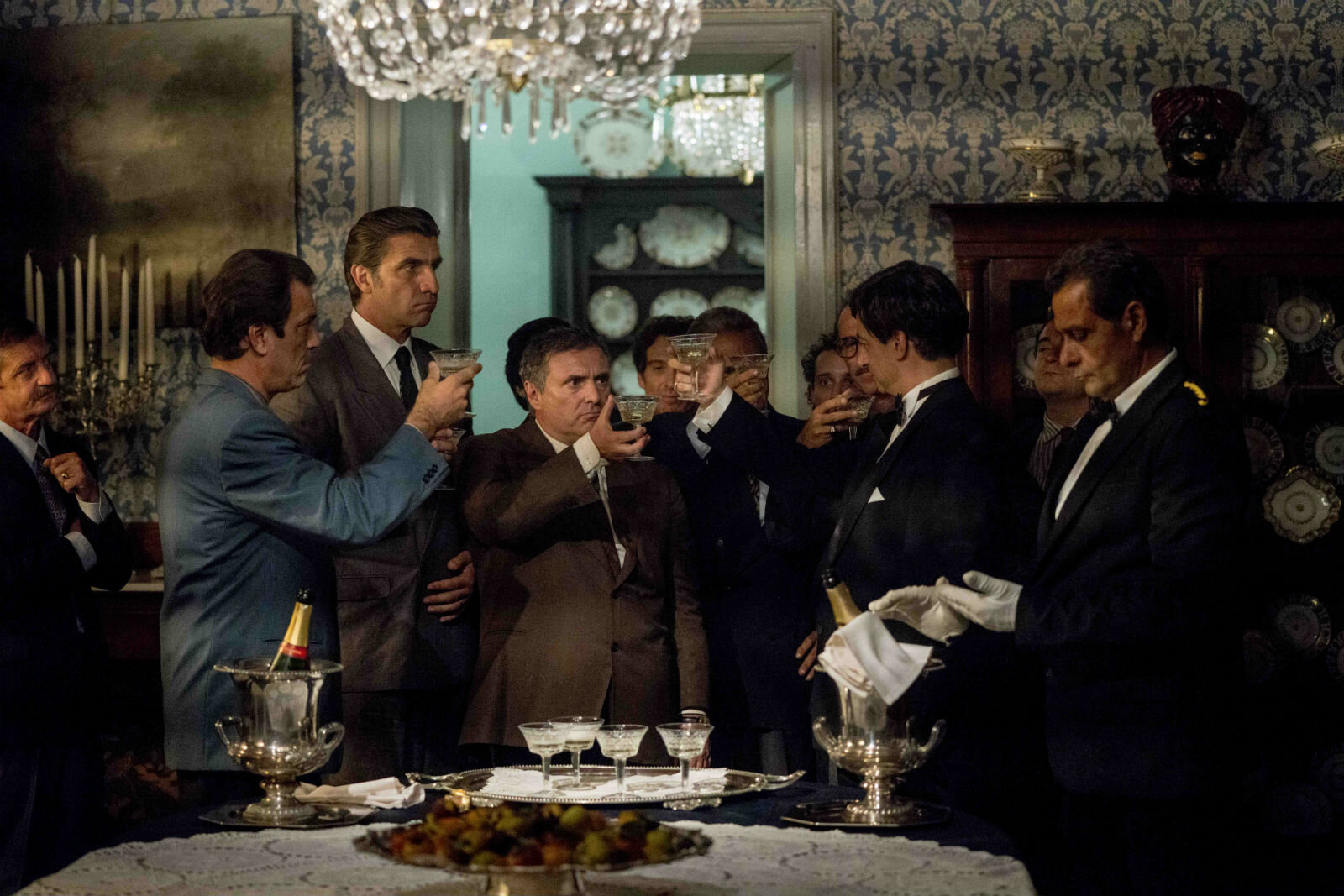The Traitor: Italian Master’s Fact-Based Mafia Drama Visually Rich but Narratively Middling
By Liam Lacey
Rating: B+
Spectacle, rage, and cathartic theatre meet in a bunkered Palermo courtroom in a pivotal scene in Marco Bellocchio’s The Traitor. The drama is a portrait of the Sicilian informant Tommaso Buscetta who, in the late-eighties and nineties, helped convict more than 300 members of the Cosa Nostra.
The circus-like atmosphere of the so-called Maxi Trial — with defendants in cages making threatening gestures and threats toward their accusers — has a quality of sulfurous black comedy. The trial was a success and a disaster, as the convictions were followed by a series of assassinations of judges and acquitted defendants.
The Traitor is a pleasure to watch. Working with cinematographer Vladan Radovic, Bellocchio blends sweeping camera work and flurries of action with painterly lighting and often ironic musical cues. The story itself is somewhat over-stuffed — the time-jumping narrative (Bellochio and three other writers are credited) and an onscreen counter of murder victims — but this is still a welcome chance to see a great old school European auteur at work.
A contemporary of Pier Paolo Pasolini and Bernardo Bertolluci, Bellocchio, now 80, is one of the secondary Italian masters of modern Italian filmmaking. He’s a poetic stylist whose half-century of films (Fists in Pocket, Devil In The Flesh, Good Morning, Night, Vincere) were tied to the chaotic politics of modern Italy and the dark triad of sex, sin, and power. As well as the spectacular trial scene, there is much else to chew on here, including many parallels to the themes of betrayal and repentance of Martin Scorsese’s late-career gangster film, The Irishman.
We first meet Buscetta (played by Pierfrancesco Favino) in the early eighties. He is a heavy-faced handsome man with thick black hair (dyed, we later discover), swaggering through his successful middle-age. He lives in a compound in Rio De Janeiro with his third wife, Cristina (Maria Fernanda Candido), his new young family, and team of security guards. Buscetta left Italy not to escape the law but a raging ongoing Mafia war, initiated by Sicilian crime boss, Salvatore “Totò” Riina (played here by Nicola Cali), who, through the early 1980s, began devastating rival Cosa Nostra families in a power grab that left hundreds dead.
When Buscetta is finally tracked down and arrested for his drug-trafficking by government thugs, he is interrogated and beaten but refuses to talk. A hard man by training, he even watches stoically as his young wife is dangled from a helicopter. Instead of spilling the goods to the Brazilians, he agrees to return to Italy. He agrees to turn state witness after learning that his two adult sons have been murdered. A sense of revenge as much as honour motivates Buscetta to betray his former colleagues.
Also, his vanity: In a series of chats with the bookish, earnest judge and prosecutor Giovanni Falcone (Fausto Russo Alesi), Buscetta seems to puff up under the scrutiny of such serious attention. Buscetta decides he can justly violate the code of silence because the new Cosa Nostra no longer follows its old honour code, respecting the sanctity of families. Soon, he’s busy outlining the hierarchy of the Sicilian crime syndicate, charges he later repeats in open court before his jeering, threatening former cohorts.
Despite its generous 2:35 hour running time, The Traitor eventually comes up a bit short. Buscetta remains something of an enigma, and we struggle to place the importance of the colourful satellite characters such as the Mafia money man who riles Buscetta in court or a former hit man who also turns ally and informer.
The climactic sequence where Buscetta, who has been hiding out in the United States in a Witness Protection Program, returns to Italy to testify again, extends the story without increasing its impact. Ultimately, The Traitor is a film of paradoxes, including the mixed rewards of a big, but lesser, film from a major filmmaker.
The Traitor. Directed by Marco Bellochio. Written by Marco Bellocchio, Ludovica Rampoldi, Valia Santella and Francesco Piccolo. With Pierfrancesco Favino, Maria Fernanda Candido, Fausto Russo Alesi and Nicola Cali. Opens February 7 in Toronto (Canada Square), Vancouver and Montreal.

